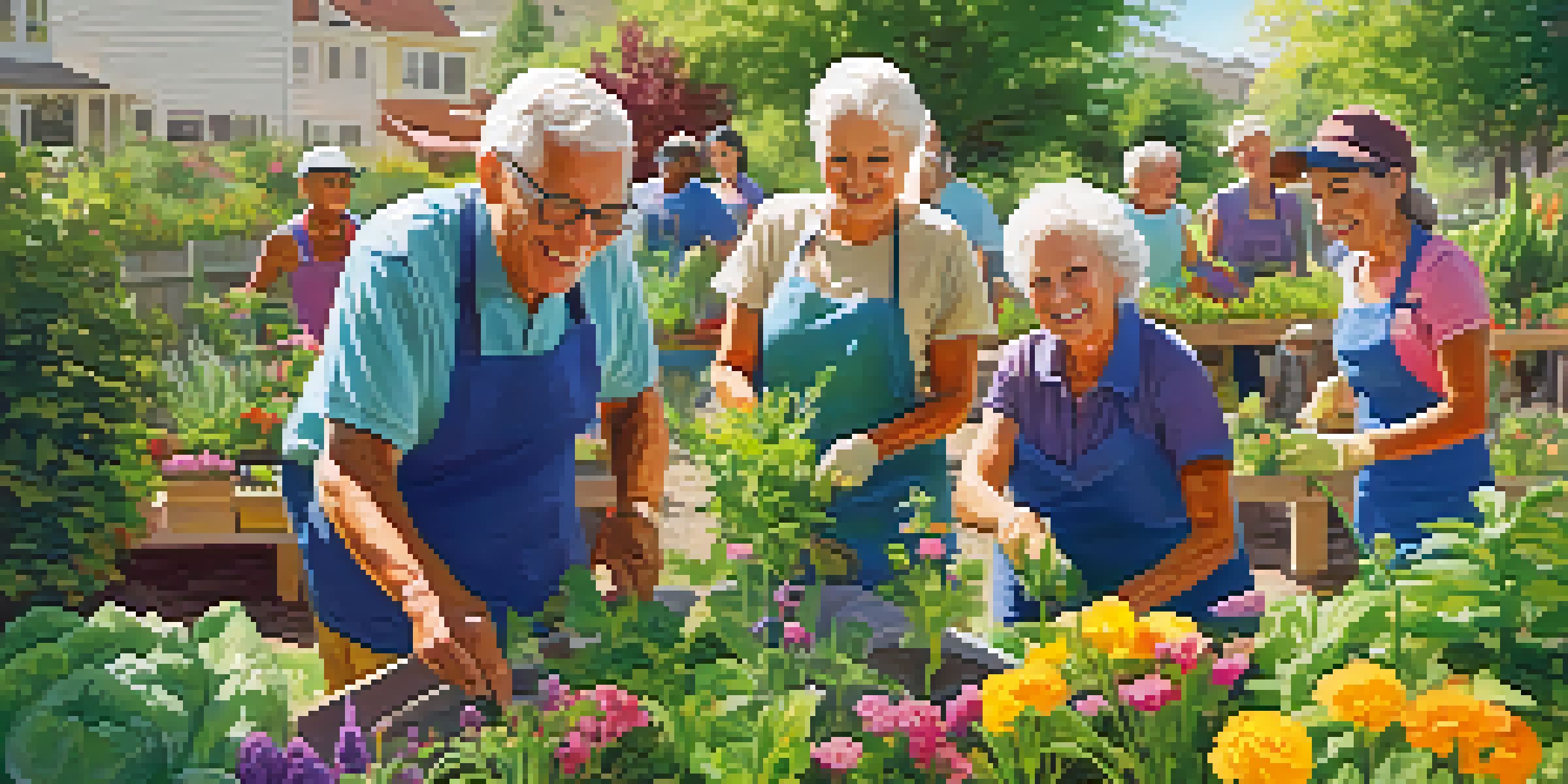Volunteer Opportunities for Seniors: Stay Active and Engaged

Why Volunteering is Beneficial for Seniors
Volunteering offers seniors a chance to contribute to their communities while also reaping personal rewards. It provides a sense of purpose and fulfillment, which can be incredibly beneficial for mental health. Engaging in volunteer work can help combat feelings of loneliness and isolation that some seniors may experience.
The best way to find yourself is to lose yourself in the service of others.
Moreover, being involved in volunteer activities encourages social interactions. By meeting new people and forming connections, seniors can enhance their social networks, leading to improved emotional well-being. This social engagement can be a vital aspect of maintaining a vibrant and active lifestyle.
Finally, volunteering can also promote physical activity, whether it's through organizing events or helping in community gardens. Staying active is essential for seniors, and volunteering presents a fun way to keep moving while making a difference in the lives of others.
Finding Volunteer Opportunities in Your Community
One of the best ways to find volunteer opportunities is to check local community centers, libraries, and places of worship. These organizations often have bulletin boards or newsletters that list upcoming events and needs for volunteers. Don't hesitate to ask staff members for recommendations on how to get involved.

Additionally, online platforms such as VolunteerMatch or Idealist can connect seniors with various volunteer roles tailored to their skills and interests. These websites allow you to filter opportunities by location and type, making it easier to find a cause that resonates with you. Many organizations also offer virtual volunteering options, expanding the possibilities even further.
Volunteering Boosts Mental Health
Engaging in volunteer work provides seniors with a sense of purpose and combats feelings of loneliness.
Lastly, consider reaching out to local charities or non-profits directly. Many organizations are always looking for help and may have roles that aren’t widely advertised. A simple phone call or visit can open doors to meaningful volunteer experiences in your area.
Types of Volunteer Work for Seniors
There are countless ways seniors can volunteer, depending on their interests and abilities. For those who love working with children, tutoring or mentoring in schools or after-school programs can be incredibly rewarding. Helping the next generation while sharing life experiences can create lasting relationships.
Volunteers do not necessarily have the time; they just have the heart.
For those who enjoy the outdoors, participating in community gardening or environmental clean-up initiatives offers a fantastic avenue to stay active. Such activities not only contribute to beautifying neighborhoods but also promote teamwork and camaraderie among volunteers.
Moreover, seniors with a passion for arts and crafts can consider leading workshops at local centers or nursing homes. Sharing creative skills can uplift spirits and inspire others, making for a fulfilling way to give back to the community.
The Impact of Volunteering on Health
Research shows that volunteering can have significant positive effects on physical and mental health. Engaging in volunteer activities can lead to lower blood pressure, reduced symptoms of depression, and even increased longevity. This is largely due to the sense of purpose and community that volunteering fosters.
In addition to mental health benefits, volunteering often involves physical activity, which is crucial for maintaining mobility and strength as we age. Whether it’s lifting boxes at a food bank or walking dogs at an animal shelter, these activities can help seniors stay fit and active.
Social Connections Through Volunteering
Volunteering allows seniors to build meaningful relationships and expand their social networks.
Furthermore, volunteering can stimulate cognitive function by providing new challenges and learning opportunities. Keeping the brain engaged with different tasks can help maintain sharpness and improve overall quality of life.
Building Social Connections through Volunteering
Volunteering is a wonderful way for seniors to meet like-minded individuals and build new friendships. Working alongside others towards a common goal fosters a sense of community and belonging, which is essential for emotional health. Many seniors find that these relationships are just as meaningful as those formed in other areas of life.
Group volunteer activities often include social events, which can further enhance these connections. Whether it’s a potluck or a volunteer appreciation day, these gatherings create opportunities to bond over shared experiences. It’s a great way to expand one’s social circle in a relaxed atmosphere.
Additionally, volunteering often leads to teamwork and collaboration, allowing seniors to develop new skills and learn from others. This exchange of knowledge can be incredibly enriching and empowering, creating lasting ties and memories.
Overcoming Barriers to Volunteering
Many seniors might hesitate to volunteer due to concerns about transportation or physical limitations. However, many organizations offer flexible schedules or remote opportunities that can accommodate these needs. It’s important to communicate any concerns with potential volunteer organizations—they’re often more than willing to help find a suitable role.
Another barrier can be the misconception that volunteering requires a significant time commitment. In reality, even small contributions can make a big difference. Seniors can choose to volunteer for a few hours a month or help with short-term projects, allowing them to participate without feeling overwhelmed.
Health Benefits of Volunteering
Research indicates that volunteering can improve both physical and mental health, contributing to a longer, healthier life.
Finally, it's crucial to recognize that everyone has unique skills to offer. Seniors may underestimate their abilities or feel nervous about entering a new environment. By focusing on personal strengths and interests, they can find roles that are both enjoyable and fulfilling.
How to Get Started with Volunteering
Getting started with volunteering is easier than it seems! First, take some time to reflect on your interests and how much time you can realistically commit. Are you passionate about animals, education, or community service? Identifying your interests will help you find opportunities that excite you.
Next, explore local resources such as community centers or online platforms to find available roles. Many organizations offer orientations or information sessions, which can provide insight into their mission and needs. Attending these sessions can also help you meet potential fellow volunteers.

Lastly, don’t be afraid to jump in and try something new! Volunteering is all about exploring different experiences, and it’s perfectly fine to test out a few opportunities before settling on one that truly resonates with you. Remember, the most important part is to have fun and enjoy the journey.